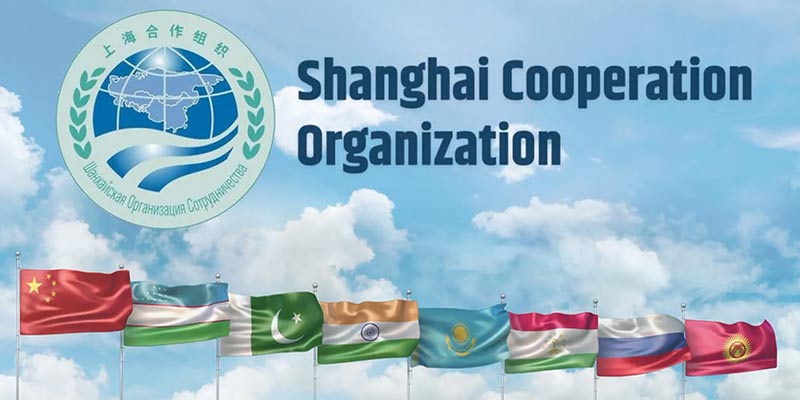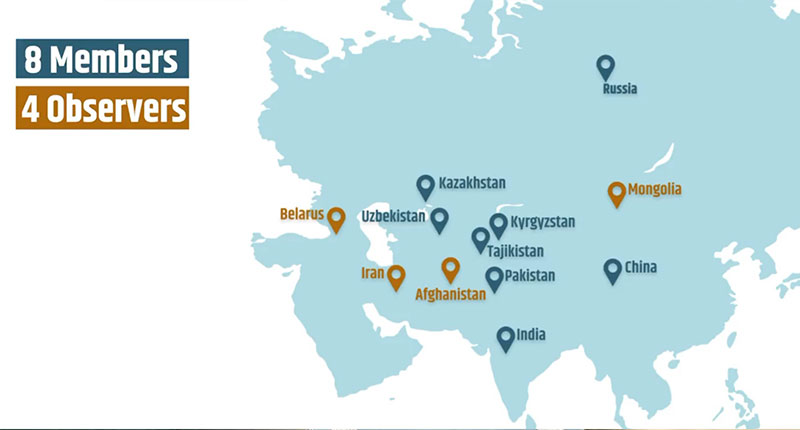- India
- May 31
India to host SCO summit in virtual format on July 4
• Under India’s first-ever chairmanship, the 23rd summit of the SCO Council of Heads of State will be held in the virtual format on July 4. It will be chaired by Prime Minister Narendra Modi.
• Last year, the in-person SCO summit took place in Samarkand in Uzbekistan that was attended by all top leaders of the grouping.
• India assumed the rotating chairmanship of the SCO at the Samarkand Summit.
• All the SCO member states — China, Russia, Kazakhstan, Kyrgyzstan, Pakistan, Tajikistan and Uzbekistan — have been invited to attend the summit.
• In addition, Iran, Belarus and Mongolia have been invited as observer states. As per SCO tradition, Turkmenistan has also been invited as the guest of the chair.
• Heads of the two SCO bodies — the secretariat and the SCO RATS (Regional Anti-Terrorist Structure) — will also be present.
• Heads of six international and regional organisations have also been invited to the summit. The organisations are the UN, the ASEAN (Association of Southeast Asian Nations), CIS (Commonwealth of Independent States), CSTO (Collective Security Treaty Organization), EAEU (Eurasian Economic Union) and CICA (Conference on Interaction and Confidence Building Measures in Asia).
• India hosted the foreign ministers of the SCO at a two-day conclave in Goa earlier this month.
What is the SCO?
• The Shanghai Cooperation Organisation (SCO) is an inter-governmental organisation founded in Shanghai on June 15, 2001. It was founded by the presidents of China, Kazakhstan, Kyrgyzstan, Russia, Tajikistan and Uzbekistan.
• These countries, except for Uzbekistan, had been members of the Shanghai Five group, formed on April 26, 1996 with the signing of the Treaty on Deepening Military Trust in Border Regions.
• The SCO Charter was signed during the St Petersburg heads of state meeting in June 2002 and entered into force on September 19, 2003. This is the fundamental statutory document which outlines the organisation’s goals and principles, as well as its structure and core activities.
• The Heads of State Council (HSC) is the supreme decision-making body in the SCO. It meets once a year and adopts decisions and guidelines on all important matters of the organisation.
• The SCO is an influential economic and security bloc and has emerged as one of the largest transregional international organisations.
Who are the members of SCO?
• The SCO currently comprises eight member states (China, India, Kazakhstan, Kyrgyzstan, Russia, Pakistan, Tajikistan and Uzbekistan).
• Currently, India holds the presidency of the grouping.
• SCO is all set for expansion with Iran joining the grouping as its ninth member while Belarus has applied for membership. The decision to admit Iran was made in Dushanbe summit in 2021 and Belarus has submitted its application.
• This is the first expansion of the SCO after India and Pakistan were admitted to the grouping in 2017.
• Other observer states interested in acceding to full membership are Afghanistan and Mongolia. There are six dialogue partners — Armenia, Azerbaijan, Cambodia, Nepal, Sri Lanka and Turkey.
• India, Iran and Pakistan were admitted as observers at the 2005 summit. On June 9, 2017, at the historic summit in Astana, India and Pakistan officially joined the SCO as full-fledged members.
• The SCO has two permanent bodies — the SCO Secretariat in Beijing and Executive Committee of the Regional Anti-Terrorist Structure (RATS) in Tashkent.
• The chairmanship of the SCO is by rotation for a year by the Member States.
The SCO’s main goals are:
• Strengthening mutual trust and neighbourliness among the Member States.
• Promoting their effective cooperation in politics, trade, economy, research, technology, culture, education, energy, transport, tourism, environmental protection and other areas.
• Making joint efforts to maintain and ensure peace, security and stability in the region.
• Moving towards the establishment of a democratic, fair and rational new international political and economic order.
India and the SCO
• India was made an observer at the July 2005 Astana Summit and has generally participated in the ministerial-level meetings of the grouping, which focus mainly on security and economic cooperation in the Eurasian region.
• India and Pakistan became its permanent members in 2017.
• India has shown keen interest in deepening its security-related cooperation with the SCO and its Regional Anti-Terrorism Structure (RATS), which specifically deals with issues relating to security and defence.
• India's chairmanship of SCO has been a period of intense activity and mutually beneficial cooperation between member states.
• India has hosted a total of 134 meetings and events, including 14 ministerial-level meetings. India remains committed to play a positive and constructive role in the organisation, and looks forward to a successful SCO Summit as the culmination of its chairmanship.
Manorama Yearbook app is now available on Google Play Store and iOS App Store


